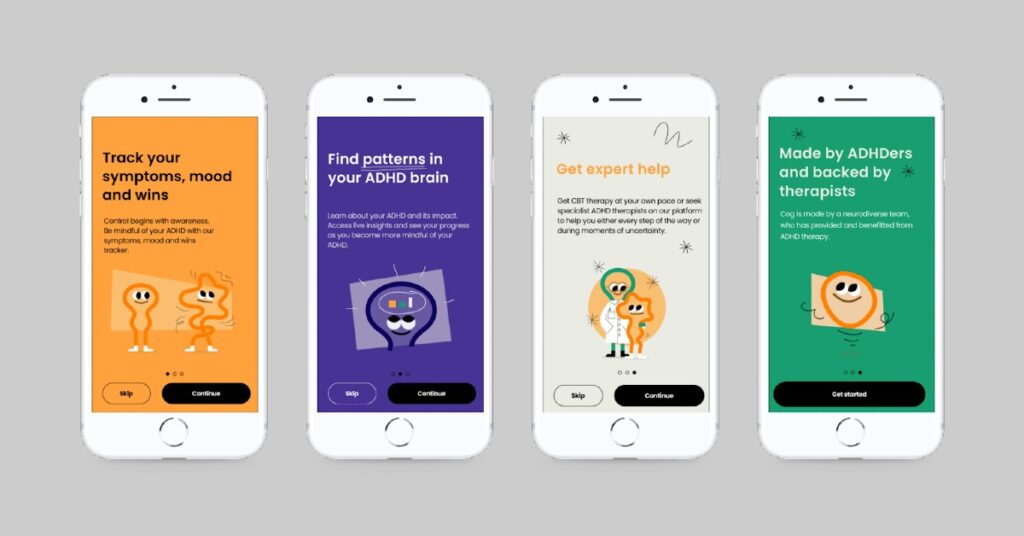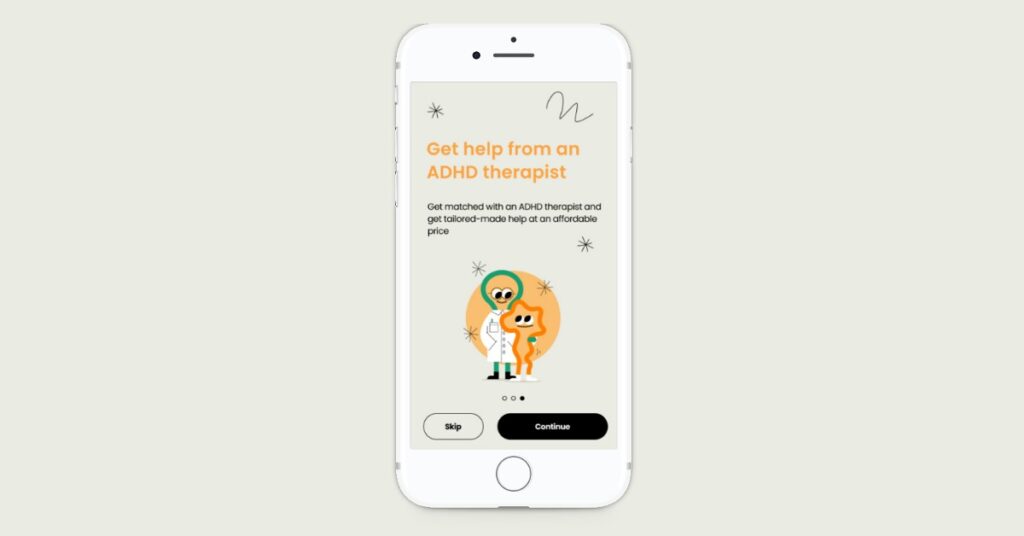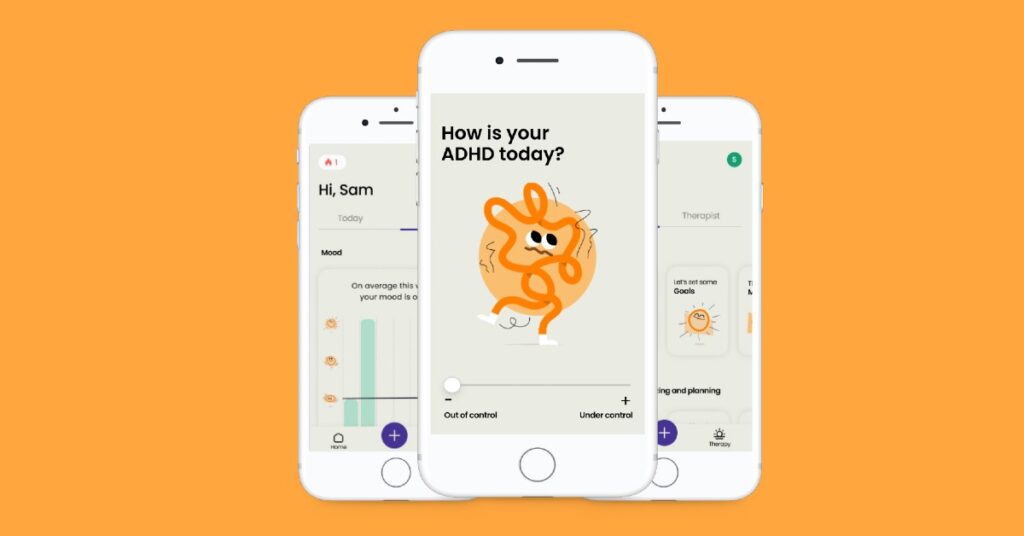“Innocent people struggling without any help or hope didn’t feel right,” says Dom Longford, founder of Cog, a modern ADHD care system.
At 31, Longford discovered he has ADHD and received great care in the Netherlands. However, he also realised that not everyone has access to this great care.
He soon discovered that waiting times for ADHD treatment in the UK can be between 24 and 48 months with treatments favouring pills over skills.
“[It] lit a fuse within me,” he says and persuaded some of his friends to join him to make ADHD care available to all.
Born from personal experience of ADHD

In 2018, Longford found himself anxious for months and was barely able to sleep.
“I could feel myself losing presence and control of things, for example, I thought I could lose my keys, job, friends, or partner at any second,” he says about the summer of 2018.
When he consulted a doctor, he expected to be told to rest and call it a burnout. However, the doctor asked, “if I considered adult ADHD?”
Longford had not considered adult ADHD but a 7 hour assessment three weeks later, he was diagnosed with hyperactivity-type ADHD.
He says, “I received medication and Cognitive Behavioural Therapy (CBT) for 9 months in the Netherlands. I’m very thankful to this country for being so advanced in identifying and supporting neurodiversity.”
When asked about the treatment for ADHD, Longford explains that effective ADHD treatment involves four to eight months of therapy and learning coping strategies.
However, during his own treatment, he struggled to turn these coping strategies into habits and felt an app would help “reiterate the education and lessons being taught by my therapist.”
At the time of his treatment, that app didn’t exist and thus Cog was born in Amsterdam, which is also our startup of the month.
“If it wasn’t for my own personal experience of ADHD, Cog wouldn’t exist,” he says, adding, “without having it, it’s difficult to understand.”
Lack of awareness and challenges
The past year has seen a major boom in ADHD tech solutions with online drug deliveries and app-based care systems becoming prominent.
Research by NIH shows that 366.33 million adults globally had persistent ADHD symptoms in 2020 and are estimated to lose an average of 22 days of productivity per year.
Longford says he was surprised to see a low number of doctors being aware of adult ADHD, which results in fewer people being referred for assessment.
“Even if you don’t have ADHD, it would be nice to see the results of an assessment rather than being turned away by a doctor who may not have much understanding of it,” he grimaces.
While research shows that ADHD is associated with under performance in school, unstable employment, and social insecurity, it can also be harnessed for elite performance.
“Many celebrities, famous athletes, and successful entrepreneurs have it,” says Longford, adding, “it’s possible to be ok with it.”
This lack of awareness is exacerbated by the fact that treatment for ADHD is either inaccessible or expensive.
According to Longford, the waiting list for ADHD assessment in the public healthcare system can stretch from 9 to 48 months.
“This is demotivating and many drop out of the system even with a referral,” he explains.
In the private healthcare system, an ADHD assessment can cost over €1,000 and treatment can cost between €2,000 and €4,000.
While most people cannot afford those prices, Longford finds the choice of medication as treatment questionable.
Important elements of ADHD care

To address these challenges, Longford designed Cog as an app that offers the important elements of ADHD treatment.
“Cog is designed by a neurodiverse team, who have made the information and feel of the app visually engaging, and easy to use,” he says.
Since Cog began signing up for the app, the app saw over a thousand people sign up with most coming through its Instagram page.
“We used Instagram to validate our app content and we’re very happy with the response,” Longford adds.
Cog began testing its MVP with 120 users from its community where it saw great engagement, valuable feedback and repeat usage of its features.
Since Cog is still testing the app, it has restricted the sign up after hitting 1,000 users.
Cog will be available for both iOS and Android users with a freemium service called symptoms tracker being rolled out on June 28.
The app begins with offering education about attention-deficit hyperactivity disorder (ADHD), an in-app Cognitive Behavioral Training and Cog Clinic.
Cog Clinic is a therapist platform that will connect people with trusted ADHD specialists for coaching and on a pay as you need basis.
With Cog Clinic, Longford says they want to make it easier for people to speak to an expert, learn, track, and manage their symptoms at a fraction of the costs involved in the current ADHD support system.
During the test of its MVP, Cog Clinic was privately launched and saw double-digit growth in sessions.
“Multiple customers told me their experience with our specialists is life-changing,” Longform says. “Things feel a bit real now, there is a sense of momentum with what we’re doing.”
Bootstrapping to success
Even though there are many apps and web sites catering to ADHD care now, the investment has not kept pace with the ecosystem.
According to Dealroom, the VC investment into the European mental health sector shrunk from $1.4B in 2021 to $354M last year.
With investors aggressively chasing profitability over growth, bootstrapping has emerged as an alternative for a lot of entrepreneurs.
Longford has also bootstrapped Cog to this point and says they are generating revenue despite being available to a small number of users.
He does plan to start conversations with investors in the coming weeks to find those who are passionate and want to make an impact in the neurodiversity space.
For Longford, the immediate focus is on building the in-app Cognitive Behavioural Therapy programme, enhancing the Cog Clinic experience, and growing its freemium symptoms tracker globally.
As a bootstrapped venture, Cog positions itself in the ADHD coaching space but Longford plans to enter the medical space with the recruitment of a Chief Clinical Officer.
ADHD-friendly world

Longford doesn’t shy away from admitting that the world is ADHD-unfriendly and sees a need to educate people to make the world a better place for those with ADHD.
He cites examples of schools where textbooks are dense, lectures are several hours long, and exams are conducted over three hours.
“This assumes that brains can focus on text for hours, but that may not be the best way for some brains to maintain focus or learn,” he says.
Those who struggle in this format are often made to feel less or inferior, and Longford says this can have a long-lasting impact on the brain.
He adds, “Some brains are visual, some need dialogue and to interact to engage.”
When asked what people can do, he is quick to say that taking a little time to understand neurodiversity can be a good start.
He also says people should stop expecting other people’s brains to work in the same way as their own.
“If someone struggles to maintain attention, or is often late, or fidgety, don’t assume it’s always a choice,” he observes.
Like physical diversity seen in humans, our brains are also diverse with different strengths.
Longford not only finds this beautiful but sees a need to speak openly about “neurodiversity, raise awareness and help people feel safe around the topic.”
While Cog is an ADHD care app at its roots, it also has a bigger mission to make this world ADHD-friendly.
It has a long road to this mission, but the first steps seem concrete enough to make it happen.
Read the orginal article: https://siliconcanals.com/news/startups/cog-amsterdam-dom-longford-adhd-care/


